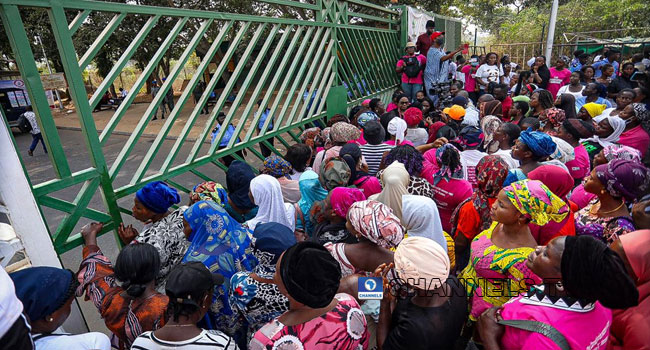When safe spaces disappear, so too does our sense of sanctuary, leaving us vulnerable in…
Resilience Against Repression: Strategies for Women’s Groups in the Face of Shrinking Civic Space
In today’s world, the struggle for women’s rights and gender equality has made remarkable progress, yet it remains a battle far from won. In many parts of the globe, women continue to face discrimination, violence, and marginalization. To address these challenges, women’s groups and organizations play a pivotal role in advocating for change. However, in recent years, there has been a worrying trend of shrinking civic space in many countries, Nigeria included. This phenomenon threatens the ability of women’s groups to operate freely and effectively. In the face of this adversity, resilience becomes the cornerstone of continued progress towards gender equality.
The Shrinking Civic Space in Nigeria
Nigeria, the most populous country in Africa, has a long history of activism and advocacy by women’s groups. From the market women who protested against colonial taxation in the early 20th century to the contemporary feminist movements, Nigerian women have been at the forefront of social change. However, in recent years, the civic space in Nigeria has been shrinking, posing significant challenges to the women’s rights movement.
Several factors contribute to the shrinking civic space in Nigeria. These include restrictive laws and regulations, increased surveillance, harassment of activists, and limited access to resources. One of the most notable legal challenges is the Non-Governmental Organizations (NGO) Regulation Bill, which, if passed, could severely limit the operations of civil society organizations, including women’s groups. This tightening of regulations constrains the ability of these groups to mobilize, advocate, and deliver services effectively.
Strategies for Resilience
In the face of these challenges, women’s groups in Nigeria are employing various strategies to maintain their resilience and continue their fight for gender equality and women’s rights.
- Strengthening Networks and Alliances: Recognizing the power in unity, women’s groups are increasingly forming coalitions and alliances with like-minded organizations. By pooling their resources and expertise, these groups can amplify their voices and increase their capacity to push for change. In Nigeria, coalitions like the Women’s Consortium of Nigeria (WOCON) and the Nigerian Feminist Forum (NFF) have been instrumental in advancing gender equality.
- Community Engagement and Mobilization: Grassroots engagement remains a powerful tool for women’s groups. By connecting with local communities and involving them in advocacy efforts, these groups can build a groundswell of support that is harder to ignore. Initiatives such as community dialogues, awareness campaigns, and capacity-building workshops empower women at the grassroots level to become advocates for their rights.
- Leveraging Digital Advocacy: The digital age has opened up new avenues for advocacy. Women’s groups are utilizing social media, online petitions, and digital storytelling to raise awareness of their causes and mobilize support. The #ArewaMeToo movement, for example, gained widespread attention on social media, shedding light on sexual harassment in Northern Nigeria.
- Capacity Building: Recognizing the importance of knowledge and skills in advocacy, women’s groups are investing in capacity-building programs. These initiatives equip activists with the tools to navigate legal challenges, engage with policymakers, and effectively communicate their messages.
- Strategic Litigation: In cases where women’s rights are violated, strategic litigation can be a powerful tool. Organizations like the Women Advocates Research and Documentation Centre (WARDC) have been at the forefront of using the legal system to challenge gender-based discrimination and violence.
- International Solidarity: Women’s groups are increasingly tapping into international networks and support systems. Building connections with international organizations and human rights bodies provides a platform for highlighting issues and exerting external pressure on the Nigerian government to uphold women’s rights.
- Inclusive Advocacy: Recognizing the intersectionality of women’s identities, advocacy efforts are becoming more inclusive. Women’s groups are working to ensure that their agendas address the needs and concerns of marginalized women, including those with disabilities, living with HIV, and displaced individuals.

Recommendations
- International Support: The international community should continue to provide support and resources to women’s groups in Nigeria. This support can help mitigate the impact of restrictive laws and regulations and enable these groups to continue their vital work.
- Advocacy for Legal Reforms: Women’s groups should intensify their advocacy efforts for legal reforms that protect and promote women’s rights. This includes opposing laws that restrict civic space and advocating for legislation that supports gender equality.
- Amplify Grassroots Voices: Efforts should be made to amplify the voices of women at the grassroots level. Their experiences and perspectives are essential in shaping effective advocacy strategies.
- Media Engagement: Collaborating with the media to raise awareness of women’s rights issues is crucial. By leveraging media platforms, women’s groups can reach a broader audience and generate public support.
Despite the challenges posed by the shrinking civic space in Nigeria, women’s groups and organizations continue to demonstrate remarkable resilience. Their strategies, rooted in collaboration, community engagement, digital advocacy, capacity building, and strategic litigation, are instrumental in maintaining momentum toward gender equality and women’s rights. As international solidarity grows, pressure mounts on the Nigerian government to protect and uphold the rights of women.
The battle for gender equality is far from over, but the determination and resilience of women’s groups in Nigeria serve as a beacon of hope. In the face of repression, they remain unwavering in their commitment to a future where women and girls enjoy the full spectrum of their rights and opportunities.




Comments (0)